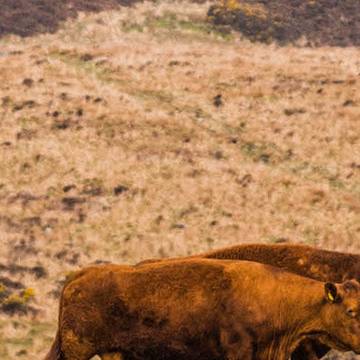
Native Breeds
Native breeds have evolved for centuries as part of their ‘terroir’, they are hardy and well equipped to deal with the climate, soil, disease and the food source available where they are grown.
Our native breed cattle are an integral part of our rural landscape, which means they can be reared in harmony with nature, using low input systems that rely on what is available in that specific geographical area.
Bred on native South West moorland, the breeding cows thrive on the poorer hill grass and rough heather and gorse-covered pastures, which they convert into mother's milk, simply the best food on the planet for their calves. The calves grow strong bones and develop natural immunity, which minimises the use of any medication. The calves stay with their mothers for at least 9 months, maximising the benefit of the milk, until their mothers supply naturally dries up.

100% Grass Fed & Grass Finished
Our cattle are 100% grass fed and grass finished, they only ever eat forage and mother's milk for their entire lives. We never feed our cattle cereals or soya. In the winter if our cattle are not out on grass they eat silage or hay that is cut from the farm earlier in the year and stored ready for winter feeding.
Our herd of native breed cattle are a living part of the 'terroir', which is the link between the soil and the food we produce from it. It is important to us that our slow-growing native cattle are helping to sustain beautiful, natural, grassland landscapes, which are not suitable for growing other food crops. At the same time, they are utilising only natural local resources and not imported protein such as soya, grown in areas which are being depleted by industrialised systems of globalised agriculture.
Some of our cattle will move into barns over the winter, for their health and the health of our soil. In the South West our winters can be incredibly wet, keeping cattle out all year round can cause a lot of damage to the soil structure by 'poaching' ground and making it much harder for the grass to recover and grow a deep root. Our cattle that move indoors November to March/April eat hay and silage cut from the farm.
Gut Health
Ruminant animals have a digestive system designed to process grass and forage and are less able to digest cereals. Modern industrial systems for growing cattle are designed to grow the cattle as fast as possible, with a diet of grain, cereals, and chemical inputs to speed growth rates. The acidity produced as a result of this unnatural diet destroys healthy gut bacteria and cattle show diabetic-like symptoms.
The biome in the stomach (rumen) of our cattle is very important, for their own health and natural immunity. When our cattle are 'chewing the cud', they are repeatedly chewing the forage with their strong molar teeth, after mixing it with their gut flora, so that no nutritional value is wasted. Their dung, returned to the pasture from a healthy gut, provides food for insects, and the billions of soil bacteria, which create sustainable biodiversity. This is an integral part of the Pipers Farm philosophy.
Slowly Reared
Our grass fed beef cattle are grown slowly until they have reached natural maturity, usually at 31 months.
We use a local, small, family run, farmyard based abattoir, where the team are highly skilled artisans. For us, reducing stress and having total control over slaughter is a vital step in the process of producing truly sustainable food. All our cattle are stunned by hand before slaughter.

Family Farms
We work with a collective of incredible family farms who rear our grass fed beef cattle. Our talented, likeminded farmers work to our standards to ensure every animal reared is of exceptional quality and has been produced in a way you can have complete confidence in. We work closely with our farmers to ensure we are treading as lightly as possible on the land and producing delicious nutritious food for your table. We believe in better farming, with a 360° respect for the environment, farmer, animals and you, the customer.

Shop our Grass Fed Beef
By choosing grass fed beef from Pipers Farm you are helping us to build a thriving rural community, sustaining small scale abattoirs, investing in traditional artisan skills, nurturing our landscape positively creating resilience - all the while eating highly nutritious food that you can enjoy with total confidence.
Slow growing native breeds and farming in harmony with nature helps us to achieve consistent taste, texture and excellent marbling in all our grass-fed beef.
All of our grass-fed beef is hung on the bone for at least four weeks, to develop a wonderfully rounded depth of flavour.
In the 30 years we have been producing grass fed beef we have won some of the country's top awards including BBC Food & Farming Best Food Producer, The Times Best Butcher and many Great Taste Stars.